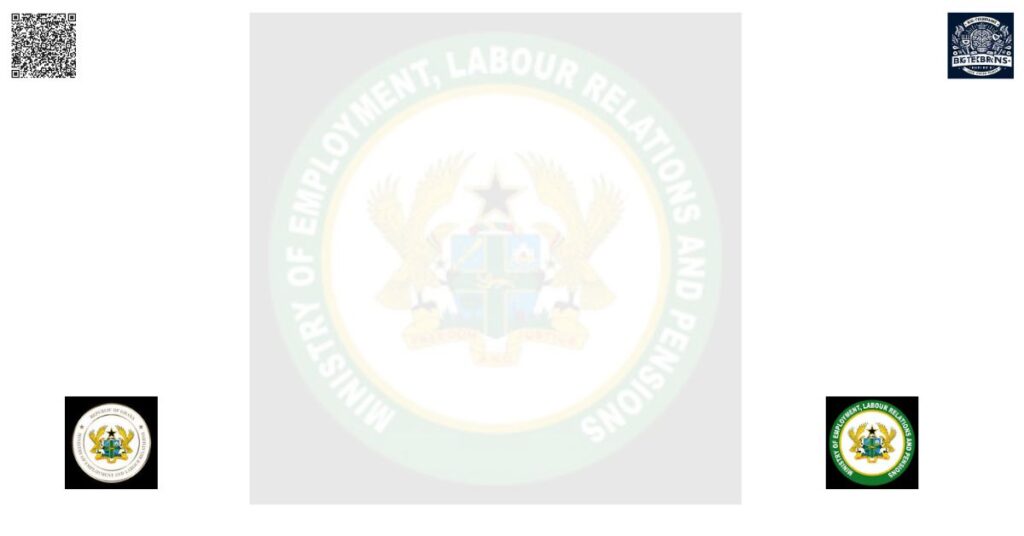Excerpt
The Ministry of Employment and Labour Relations (MELR) of Ghana plays a pivotal role in shaping the nation’s labor landscape. This article delves into its historical background, constitutional mandate, organizational structure, leadership hierarchy, recruitment processes, associated offices and units, notable achievements, and other pertinent information.
Historical Background
Established under the Civil Service Act of 1993 (PNDC Law 327), the MELR has been instrumental in formulating policies related to employment and labor issues in Ghana. In January 2021, through Executive Instrument (EI 12), the Ministry’s mandate was further defined to include the development of sector plans, coordination of specific interventions, promotion of harmonious labor relations, and the elimination of child labor.
Constitutional Role and Mandate
The MELR is constitutionally mandated to:
- Formulate policies on labor and employment issues.
- Develop sector plans and coordinate employment-related interventions.
- Promote harmonious labor relations and workplace safety.
- Monitor and evaluate the implementation of policies, programs, and projects aimed at accelerated employment creation for national development.
These functions are executed through tripartite consultations with the National Tripartite Committee (NTC) and other social and development partners.
Organizational Structure
The Ministry is headed by a Minister, supported by a Deputy Minister. Administratively, the Chief Director serves as the head, assisted by four line directorates, nine units, three civil service departments, and nine agencies. The departments include:
- Labour Department (LD)
- Department of Co-operatives (DOC)
- Department of Factories Inspectorate (DFI)
The agencies under the Ministry are:
- Ghana Co-operative College (GCCo)
- Ghana Co-operative Council (GCC)
- National Labour Commission (NLC)
- Fair Wages and Salaries Commission (FWSC)
- Youth Employment Agency (YEA)
- National Pensions Regulatory Authority (NPRA)
- Management Development and Productivity Institute (MDPI)
Leadership and Ranks
The political leadership comprises the Minister and Deputy Minister, while the Chief Director leads the administrative functions. The Chief Director is supported by directors heading various departments and units within the Ministry.
Mode of Appointment and Recruitment
Appointments within the MELR are governed by the Civil Service Act, 1993 (PNDC Law 327). The Minister and Deputy Minister are political appointees nominated by the President and approved by Parliament. The Chief Director and other civil service positions are filled through the Public Services Commission’s recruitment processes, ensuring merit-based appointments.
Associated Offices and Units
The MELR collaborates with various departments and agencies to fulfill its mandate. Key among them are:
National Labour Commission (NLC):
- Oversees the administration of labor laws and resolution of industrial disputes.
Fair Wages and Salaries Commission (FWSC):
- Manages public service pay policies.
Youth Employment Agency (YEA):
- Implements youth employment initiatives.
National Pensions Regulatory Authority (NPRA):
- Regulates pension schemes in Ghana.
Constitutional Reforms
Over the years, the Ministry has undergone reforms to enhance its efficiency and responsiveness to labor market dynamics. Notably, the establishment of the Fair Wages and Salaries Commission in 2007 aimed to implement the Single Spine Pay Policy, ensuring fair and equitable wages across the public sector.
Achievements
The Ministry has recorded significant milestones, including:
Development of the Ghana Labour Market Information System (GLMIS):
- A platform providing job matching services and labor market trends.
Revision of the National Occupational Safety and Health (OSH) Policy and Bill:
- Enhancing workplace safety standards.
Promotion of harmonious industrial relations:
- Through effective mediation and dialogue mechanisms.
References
- https://www.melr.gov.gh/2/files/publications/6/1/5/2/1/brief-history
- https://en.wikipedia.org/wiki/Fair_Wages_and_Salaries_Commission
- https://ndpc.gov.gh/media/MIinistry_of_Employment_and_Labour_Relations_APR_2017.pdf
- https://www.ghanaweb.com/GhanaHomePage/features/Why-I-believe-Dr-Rashid-Pelpuo-is-the-ideal-choice-for-the-Ministry-of-Labour-Jobs-and-Employment-1968980
- https://melr.gov.gh/
- https://www.melr.gov.gh/2/files/publications/6/1/5/2/1/brief-history
- https://ndpc.gov.gh/media/MIinistry_of_Employment_and_Labour_Relations_APR_2017.pdf
- https://en.wikipedia.org/wiki/Ministry_of_Employment_and_Labour_Relations_%28Ghana%29
- https://www.loc.gov/item/lcwaN0027600/
- https://new-ndpc-static1.s3.amazonaws.com/CACHES/PUBLICATIONS/2016/07/15/Ministry%2Bof%2BEmployment%2Band%2BLabour%2BRelations_2014-2017.pdf
- https://new-ndpc-static1.s3.amazonaws.com/CACHES/PUBLICATIONS/2016/02/27/Ministry%2Bof%2BEmployment%2Band%2BLabour%2BRelations_2014_APR.pdf
- https://www.ghana.gov.gh/ministries/89eeb1f13e/
- https://moti-gh.com/labour-employment/index.html
- https://www.businessghana.com/site/directory/ministries/21069/Ministry-of-Employment-and-Labour-Relations
- https://www.govserv.org/GH/Accra/981328988600319/Ministry-of-Employment-and-Labour-Relations

